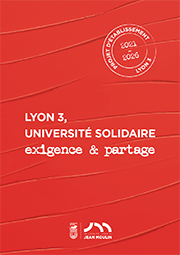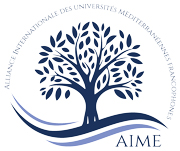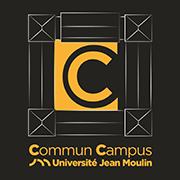AccueilRechercheProgrammes et productions scientifiquesThèsesThèses soutenuesThèses soutenues - 2006-2021Thèses soutenues - 2018
-
Partager cette page
- Recherche,
KHALIFA Tarek
Genèse de la critique poétique arabe moderne
Publié le 21 mai 2019 – Mis à jour le 21 mai 2019
Thèse en études arabes et islamiques, soutenue le 20 novembre 2018.
Durant un siècle et souvent pendant la même période, nous pouvons découvrir des poètes classiques, néoclassiques, romantiques, symboliques et réalistes. La production poétique a aussi été très variée et a respecté les règles classiques relatives à la mesure et aux rimes tout en affichant un retour vers la forme classique pour affirmer la maîtrise. Puis, l'inspiration du "muwaššaḥ" a fait son apparition et s'est détourné de l'exigence de la forme traditionnelle avec quelques tentatives pour écrire de la poésie libre et en prose avec de nouvelles mesures et enfin l'arrivée de la poésie blanche...etc.
Toutes ces tentatives pour se rattacher à un courant n'ont pas échappé à la critique qui a parfois ouvert la voix aux poètes et a parfois précédé la production poétique et qui a subi la pression moderniste en essayant de la rejoindre; la critique a puisé dans les écrits anciens et en même temps une ouverture sur la critique occidentale. La révolution contre le traditionalisme est lancée avec des écoles qui ont revendiqué une coupure avec l'héritage des classiques.
D'autres courants vont résister à l'influence européenne en prenant pour prétexte le combat contre le colonialisme occidental. Ces courants très résolus ont défendu l'attachement à l'ancienne école en invoquant la pureté de la langue du Coran, la richesse de cet héritage et le fait que cette modernisation peut susciter des théories inadaptées à la réalité sociale et culturelle.
Nous tentons dans cette étude de présenter et d'analyser les quatre étapes que la poésie et la critique poétique ont traversées durant cette période :
- L'étape de l'imitation médiocre.
- L'étape de l'imitation cohérente et éloquente.
- L'étape de l'innovation liée à la ferveur nationaliste.
- L'étape de l'innovation liée à un sentiment de liberté individuelle.
The research work presented in this manuscript focuses on the evolution of the modern Arab poetry critic. The work is two fold: one diachronic and the other analytical. We detail on one hand the history of such evolution, which, in the space of a century, has been quite impressive, and on the other hand,we analyze this phenomenon, which has never occurred in the world literacy history over such a short time span. The period of the nahda started in the second half of the XIXth century and lasted up to the last years of the XXth century.
The history of the Arab literature has been shattered by numerous events, at the same time conservative and modernist. Those events were at times contiguous and at times opposite: poetry in particular, has caught up with a major delayof nearly five centuries, as witnessed by the number of poems and collections published,and as well asby the multiplication of styles and literacy schools.
Over the span of a century, and often within the same period, one may discoverand study classical, neoclassical, romantic, symbolic as well as realist poets. Furthermore, the poetry production has also been diversein styles, but at the same time addressed the classical rules related to the measure and the rhymes, while displaying a reversal movement towards the classical form, mainly to show and prove mastering skills. Then, the inspiration of the "muwaššaḥ" appeared and has strayed away from the requirements of the traditional form, with a few attempts to write free poetry as well as prose with new measures, and eventually came to the birth of white poetry,… etc.
All those various efforts attempting atreclaiming a main historic literacy flow has definitely not been overlooked by the critic, which at times has brought forward poets, and at times has even preceded the poetic production which has undergone through the modernistic pressure by trying to join that same flow; the critique has drawn in the ancient scripts and at the same time in the opening into the occidental critic. The revolution against traditionalism has been launched with various schools who have claimed a split with the inheritance of the classics.
Other currents have resisted to the European influence by pretexting a fight against occidental colonialism. These very resolute currents have defended the attachment to the ancient school by invoking the purity of the language of the Koran, the richness of this heritage and the fact that this modernization can produce ill-adapted theories to the social and cultural reality.
We attempt in this work to present and analyze the four stages, through which poetry and the poetry critic have gone through during the past century:
1) The stage of mediocre imitation
2) The stage of coherent and eloquent imitation,
3) The stage of innovation linked to a nationalist fervor
4) And eventually the stage of innovation linked to a feeling of individual freedom.
Mots-clés : Critique Arabe, Nahda, Poésie Arabe, Modernité, Tradition, Théorie, Stylistique, Héritage, Ecole romantique.
Keywords : Arabic Poetry, Arabic Critical, Modern Criticism, Old Criticism, Critics Views, Stylistic, Heritage, Romantic theory.
Directeur(trice) de thèse : Henri Hassan SAHLOUL
Membres du jury :
-M. SAHLOUL Henri Hassan, Directeur de thèse, Professeur des universités, Université Jean Moulin Lyon 3,
-Mme DENOOZ Laurence, Professeur des universités, Université de Lorraine, Nancy.
-M. GHARRAFI Miloud, Maitre de conférence, habilité à diriger des recherches, Ecoles Militaires de St Cyr – Coetquidan, Rennes.
-M. DEHEUVELS Luc, professeur des universités, INALCO Paris,
-M. VAUTHIER Elisabeth, Professeur des universités, Université Jean Moulin Lyon 3.
Président(e) du jury : Elisabeth VAUTHIER
Documentation
Mise à jour : 21 mai 2019







